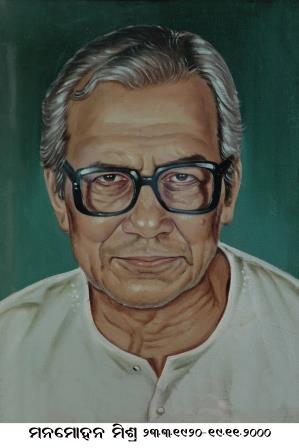Born :- 30-Mar-1920
Died :- 19-Nov-2000
Place of Birth :- Biranarasinghpur, Puri

Mr. Manmohan Mishra, a freedom fighter, trade union leader, poet and linguist was born in Birnarsinghpur in Puri district. He was a worthy child of his arents – Nilakantha and Harapriya Devi.
The Communist Party of India was founded by Bhagbaticharan Panigrahi, Prananatha Pattnayak and and Gurucharan Pattnayak and was joined by revolutionary poet of fame, Anant Pattanayak and Vaidyanatha Rath. But when Anant Pattnayak was released from prison in 1922, Manmohan Mishra's revolutionary voice came to be known in the public. Poems written by Manmohan eulogising Bhagwaticharan’s literary and revolutionary talent were published in the collection ‘Koti Kanthe’ (In the Voice of Millions) later translated into English by another leader of the party and writer Asish Mohapatra.
Manmohan’s four poetry compilations are: ‘In the Voice of Millions’, ‘Janatar Daka’ (Call of the Masses), ‘Nua Gapatie Lekha’ (Script a New Story) and ‘Awas’ (The Voice) — it was all guided by communist thought, empathy for workers, protests against exploitation, and voice of ridicule for the prevailing social system. In his first book, Koti Kanthe, he called upon the workers to keep fighting against exploitation and for establishment of a society based on justice and equity. The tone and tenor of Manmohan's poetry was replete with sincerity and humanitarian sentiment.
After the founding of the ‘Navyuga Sahitya Samsad’ in 1935, Odia literature had sought out its own brand, ie. Marxian thought. Literary works by progressive poets were creative, embracing industrial culture as a reality of the time. Again, such progressive poetry was respected for its socialistic approach.
Besided being a poet, Manmohan Mishra was also a great prose writer. ‘The World War and its Aftermath’ is one such book containing feature articles that are very factual and based ontheoretical principles. He has also written linguistic books such as ‘The Use of the Colloquial Language’ and ‘The Science of the Colloquial Ho Language’.
Manmohan Mishra was a great revolutionary and a poet of the masses, who had immensely inspired the freedom fighters and the working class by writing and singing his songs for them in their own language and rhythm, while leading them against the British rule and in post-independence mass struggles against maladministration, official adoption of capitalist methods in nullification of the spirit of freedom struggle, exploitation of the workers by industries, misuse of State Exchequer for benefit of a few when the majority was being jostled into wretchedness and treachery of politicians in power after independence. Dreams of freedom fighters for a People’s Republic having been lost in the labyrinth of capitalistic control over administration, Manmohan’s poems are still relevant in guiding the Republic back to the track.
